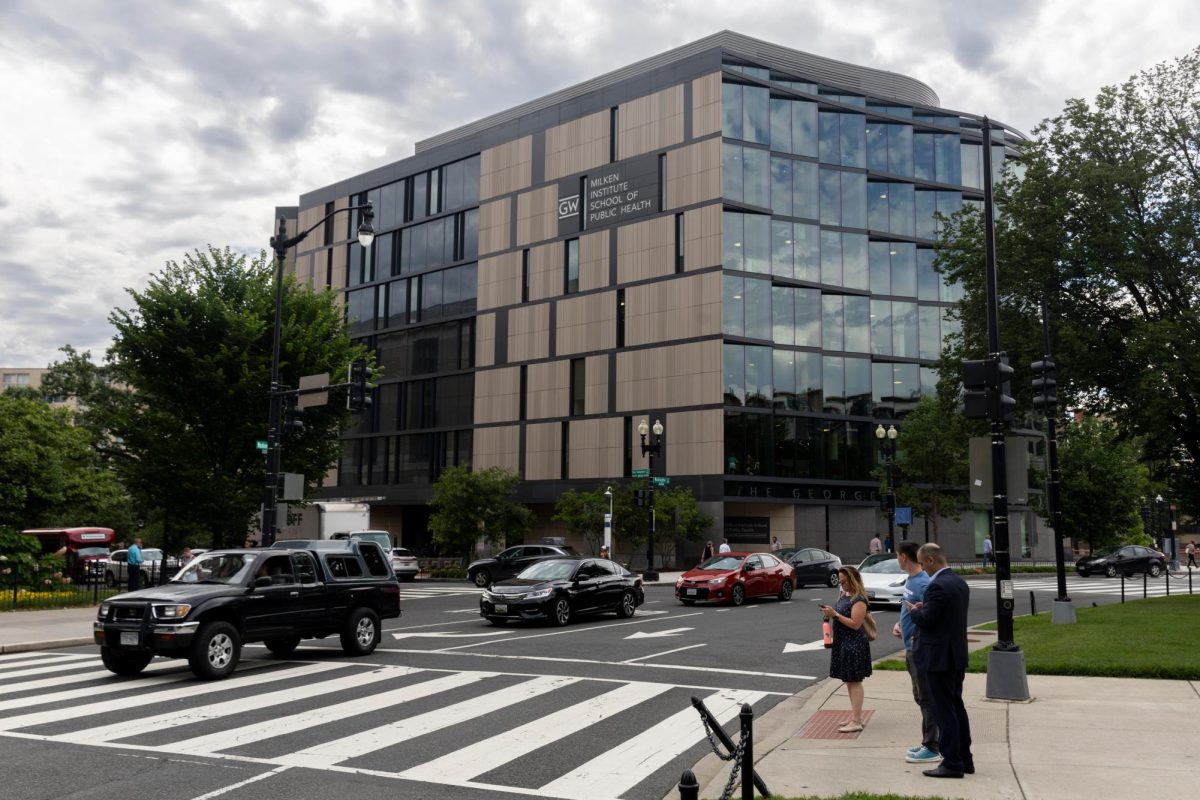“Be alert. Walk with confidence and purpose. Be aware of your surroundings – know who’s out there and what’s going on. Trust your instincts – if a situation or place makes you feel uncomfortable or uneasy, leave.” These tips are just a few suggestions of ways to avoid becoming a crime victim from the Metropolitan Police Department’s Web site.
The District is known for its high crime rate, but in the last decade crime has declined. From Aug. 2001 to Aug. 2002 sexual assault decreased 10.5 percent and robbery decreased 3.8 percent. D.C. may appear to be safer than a decade ago, but that does not mean students should let down their guard.
“I definitely have a false sense of security,” junior Cara Stein said.
Stein said she has walked home alone many times after a night out or studying at the library.
“I’ve never had a problem so I figure what’s the big deal and I don’t feel like waiting for 4-RIDE,” Stein said. “At the same time I live by myself and if something were to happen to me, no one would know but I don’t think about it. I just go and walk.”
Many students said they have benefited from 4-RIDE late at night, or curiously pushed the button on a blue light call-box, but there is more that UPD has to offer that often falls under the radar of the student population.
The University Police Department offers more than 60 crime prevention programs each year, in addition to security and police presence of which many GW students are unaware.
“Everyone knows about UPD because everyone’s getting caught by them,” sophomore Logan Hanna said. “But no one knows about these programs.”
The Rape Aggression Defense program offers classes that teaches basic self-defense techniques, designed specifically for women, from various martial arts disciplines.
Senior Jean Resnevic, from Lincoln, R.I., took the class with a friend her first year at GW.
“We did it because we were freshmen from small towns coming into the big city,” Resnevic said. “Our parents instilled a lot of fear in us.”
Resnevic said she never had to use any of the skills she learned from RAD she still remembers what to do if attacked from behind – “Drop my weight.”
The class was also fun, Resnevic said.
“We were kicking and punching things,” Resnevic said “It was really stress-relieving.”
Now Resnevic has a younger sister at GW and plans on advising her sibling to take the class.
According to UPD’s Web site, there are two levels of the training, RAD I and the advanced RAD II, both taught by members of UPD that are certified through the RAD Systems and have completed many hours of intensive training. It takes 12 hours to complete RAD I and RAD II requires 16. The only cost is a $12 course book.
UPD also offers programs to target specific types of crime. Operation ID is a theft prevention program in which UPD engraves students’ and staff members’ valuable equipment.
UPD also recently expanded two of its most familiar services, blue light phones and 4-RIDE. According to UPD statistics, the blue light call boxes were used 65 times including false alarms between July 1, 2001 and June 30, 2002. In the same time period, they added six call boxes and relocated two because of construction.
“We now have 26 blue light phones at Foggy Bottom, and we added three to Mount Vernon last year,” UPD Chief Dolores Stafford said. “If the button is pushed on the phone, we respond, regardless of whether or not someone talks (on the other end).”
The 4-RIDE campus escort service continues to see major increases in the number of students riding the vans. The program started in 1994 with one driver and one van, and has grown to include 10 vans and 15 full-time staff members.
In the past year, UPD has transported 73,688 people, an all time high and a 43 percent increase from last year’s figures. The number of students riding has more than doubled in the last two years.
The service’s popularity has its drawbacks, though, as callers have complained of 4-RIDE delays and lapses in service.
“It takes a long time, and that’s if they do pick up,” junior Sharmin Sitafalwalla said.
New on campus this year is the Campus Watch program, where trained student volunteers use free cellular phones to report suspicious activity and security breaches on campus. This program is underway and UPD will release figures on its success next month.
UPD also offers bike registration, EMeRG (Emergency Medical Response Group), sexual assault crisis consultation and a lost and found.
Both Sitafalwalla and Hanna said UPD should do more to educate students about what they offer, suggesting that they announce their programs during Colonial Inauguration and Freshman Advising Workshop.
“They should have better advertising rather than just a small blurb on a poster in the corner of a residence hall,” Hanna said.
In early September, students raised security concerns in upperclassmen residence halls after an intruder entered City Hall and UPD did not respond to calls for two hours. Several students criticized UPD and residents questioned why there is no police security desk in upperclassmen buildings like in Thurston Hall and the Hall on Virginia Avenue.
Stafford, who also serves as president of the 1600-member International Association of Campus Law Enforcement Administrators, surveyed schools in GW’s “market basket” and other D.C. schools last year to see how the University’s residence hall security programs stacked up against other institutions.
“We are way ahead of our competition with regard to the amount of security that we provide to the halls,” Stafford said. “Some of the institutions don’t even allow their police force to patrol the residence halls.”
UPD patrols each residence hall every two to three hours, Stafford said, and as an additional line of defense, there are Community Hosts in residence halls without 24-hour security.
Stafford said at some D.C.-area schools, hall staff must invite security into the building to respond to incidents some universities discourage security and police officers from patrolling the residence halls.
“Only 10 percent of the institutions I contacted actively have their police or security staff patrol their residence halls,” Stafford said.
Stafford said students and staff must do their part by making sure that they do not defeat the security systems in place, such as letting strangers into a secured facility.
“We can’t do the job without the help of everyone on campus,” Stafford said. “We need every student and employee to do their part. That includes taking reasonable precautions with regard to their own personal safety and using good judgment and common sense.”
-Adina Matusow contributed to this report.



